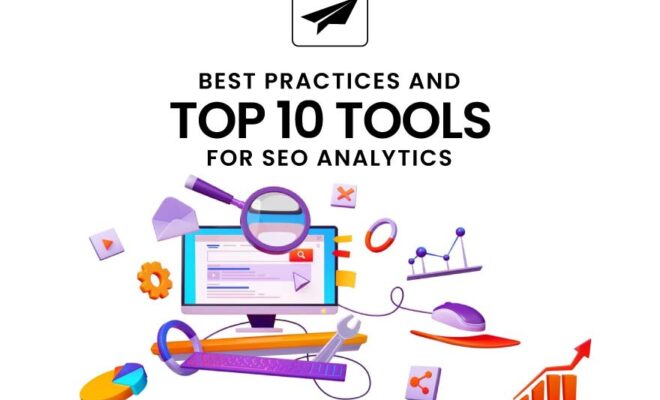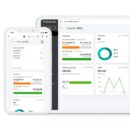Best Practices and Top 10 Tools for SEO Analytics

SEO analytics is like having a guide for your online journey. That’s where SEO becomes your digital compass. It helps companies understand how people see and operate their sites. Were you aware that a search engine initiates 90% of online experiences? Analyzing website traffic and user searches allows companies to make smart choices. It enables them to improve their online existence.
Consider your website as a store in a busy marketplace. Successful SEO is like setting up a prominent sign declaring, “We provide what you need.” It’s about standing out instead of notice. When you optimize your website, it becomes a guide for users to find what they want. It’s not having a website but a digital store that radiates online.
Best Practices for SEO Analytics
Following are the best practices for SEO Analytics:
- Keyword Research:
Effective SEO begins with targeted keywords. It acts as the navigational guide for your online content. These keywords are not words but the essence of user intent. Selecting keywords that are relevant to your audience enhances visibility. It helps align your content with what users search for. SEMrush, Ubersuggest, and Google Keyword Planner offer priceless insights into search volume and competition. They also help discover new keywords to enhance your online presence.
- On-Page Optimization:
The heart of SEO lies in on-page optimization. Content quality and relevance take center stage in this crucial aspect. Relevant content engages your audience, and impresses search engine algorithms. Also, focusing on meta tags and descriptions is essential. They shape your site’s introduction in search results. They also influence user clicks and search engine rankings.
- Technical SEO:
To promote your website’s performance, concentrate on technical SEO basics. Speed up your site and make it responsive for a better user experience and higher search rankings. Remember, many people use mobile devices, so optimization is crucial. Help search engines navigate your site by submitting XML sitemaps. Control what parts of your site search engines access by using robots.txt.
- Backlink Analysis:
Backlinks play a pivotal role in SEO, but quality trumps quantity. Evaluating backlink quality involves assessing relevance and authority. Tools like Ahrefs assist in identifying valuable backlinks and areas for improvement. Checking for harmful backlinks is essential. Disavowing such links through Google Disavow helps maintain a healthy backlink profile.
- Regular Content Audits:
Regular content audits are imperative to keep your digital content relevant and effective. Updating outdated content ensures its continued value to users and search engines alike. It’s not about freshness. It’s about ensuring that every piece of content aligns with your SEO goals. Regular evaluations are essential to address user intent. They incorporate targeted keywords and contribute to a cohesive content strategy. These evaluations ensure purposeful content development.
Top 10 Tools for SEO Analytics
1. Google Analytics
Google Analytics stands as the cornerstone for comprehending website traffic dynamics. This powerful tool overviews user behavior, popular content, and traffic sources. It also offers a robust platform for efficient conversion tracking. By leveraging Google Analytics, businesses can measure the success of their online goals and strategies. This data-driven approach enables informed decision-making. Organizations can optimize user experiences and tailor their digital presence for impact in the evolving online landscape. With its array of features and metrics, Google Analytics empowers website owners. It enables them to gain valuable insights, refine strategies, and ensure a well-informed and strategic online presence.
2. SEMrush
It is distinguished as a comprehensive SEO toolkit. It presents powerful instruments for optimizing online presence. It excels particularly in competitor analysis. It supplies valuable insights into competitor strategies, keywords, and performance metrics. This profound understanding of your competitors provides a strategic advantage in refining and enhancing your SEO approach. The toolkit, with its robust set of features, facilitates the improvement of your website’s visibility. It ensures that you stay ahead in the competitive online landscape.
3. Ahrefs
Renowned for its advanced capabilities, this specialized tool excels in meticulous backlink analysis. It offers users a thorough examination of the quality and quantity of links directing traffic to their websites. Beyond this, its exceptional skill in keyword tracking stands out, allowing for real-time monitoring of keyword rankings. This dynamic feature ensures accurate insights into your website’s performance. It also facilitates informed decision-making for strategic content optimization. With these robust capabilities, this tool emerges as an invaluable resource. It empowers businesses to maintain a solid and competitive online presence in the digital landscape.
4. Moz
Moz, a prominent player in the field of SEO, transcends conventional insights. It offers invaluable guidance for precise page optimization. Users can leverage its comprehensive suite of tools to enhance the performance of individual pages with meticulous detail. Furthermore, Moz’s toolset includes robust features dedicated to tracking domain authority. It is a pivotal metric that shapes site credibility and search engine rankings. Users gain a complex understanding of their website’s performance by utilizing Moz’s multifaceted capabilities. They also identify areas for improvement and elevate their online presence. The platform has an unwavering commitment to excellence. This commitment positions it as an essential resource for businesses and individuals.
5. Screaming Frog
Screaming Frog functions as a digital detective. It crawls through websites to identify and unveil technical issues that could impact performance. It is pivotal in maintaining a robust online presence by addressing and optimizing search engines. This comprehensive tool goes beyond issue identification. It provides actionable insights for enhancing website functionality, user experience, and search engine performance. With its ability to analyze website structure and content details, it becomes a crucial friend. It plays a vital role in the ongoing quest for online success.
6. Google Search Console
Google Search Console plays a crucial role by providing essential data on the indexing and crawling of your website. As a direct line of communication with Google, it offers comprehensive performance reports. These reports deepen your understanding of how your website appears in search results and provide valuable insights for informed decision-making. Furthermore, it identifies and highlights specific areas for improvement.
7. Yoast SEO
Yoast SEO plays a crucial role as a signal for on-page optimization. It offers essential guidance in crafting search-engine-optimized content. It also conducts thorough readability analysis. It ensures that content is optimized for search engines and accessible and understandable to readers. The dual focus on SEO and readability sets Yoast SEO apart. It positions Yoast SEO as an invaluable tool for content creators.
8. SpyFu
SpyFu excels in revealing competitor keyword strategies. It provides in-depth insights into their target keywords. This invaluable information aids in shaping your SEO approach for greater competitiveness. Additionally, SpyFu provides AdWords insights and an understanding of competitors’ paid advertising strategies. It includes analyzing keywords, ad copy variations, and performance. Leveraging SpyFu empowers you to optimize your SEO tactics. It also enhances your paid advertising efforts for the most significant impact and visibility in the online landscape.
9. Serpstat
Serpstat excels excels in keyword and competitor analysis. It surpasses the basics to unveil new keyword opportunities. It provides valuable insights into the competitive landscape. Going a step further, it offers advanced rank-tracking features. It also enables users to track their search engine positions. This multifaceted approach positions Serpstat as a versatile tool. It helps to maintain a competitive edge and optimize strategies in the dynamic world of online visibility.
10. Ubersuggest
Ubersuggest is a versatile tool. It offers extensive capabilities for comprehensive keyword research and content ideation. Beyond these core functionalities, it adds another layer of value by providing crucial backlink data. It includes insights into your website’s link profile and those of your competitors. It contributes to creating a well-rounded and effective SEO strategy. You can refine your content with ubersuggest. It strengthens your site’s authority and positioning in the competitive online landscape.
Tools Comparative Analysis
| SEO Tools | Strengths | Weaknesses |
| Google Analytics | In-depth website traffic insights | Complex interface for beginners |
| Conversion tracking | Limited real-time data | |
| SEMrush | Comprehensive SEO toolkit | Steeper learning curve |
| Versatile competitor analysis | Higher pricing for some users | |
| Ahrefs | Exceptional backlink analysis | higher pricing |
| Robust keyword tracking | Less focus on social media metrics | |
| Moz | Valuable page optimization insights | Limited backlink data compared to competitors |
| Reliable domain authority metrics | – | |
| Screaming Frog | In-depth website crawling and analysis | Requires desktop application |
| Excellent for technical SEO audits | Limited cloud-based features | |
| Google Search Console | Direct insights from Google | Limited historical data |
| Essential for indexing and crawling data | Fewer features compared to third-party tools | |
| Yoast SEO | Excellent on-page optimization guidance | focuses on content-related SEO |
| Readability analysis | May not cover all SEO aspects | |
| SpyFu | Effective competitor keyword analysis | Limited data for smaller or newer websites. |
| Insightful AdWords data | ||
| Serpstat | Strong focus on keyword and competitor analysis | Overwhelming interface |
| Rank tracking features | Fewer integrations compared to competitors | |
| Ubersuggest | Accessible keyword research | Limited advanced features |
| Content ideation | Not as robust for in-depth SEO analysis |
Industrial Uses:
SEO Analytics plays a pivotal role in diverse industrial sectors. Below are essential applications in industries:
- Competitor Analysis: Examining competitors’ online strategies helps industries comprehend market trends and consumer preferences. It also reveals areas for improvement. It offers insights into competitors’ keyword strategies, backlink profiles, and online performance.
- Supply Chain Optimization: It contributes to optimizing the online presence of manufacturers within the supply chain. This optimization enhances visibility, increases inquiries, and fortifies business relationships.
- Local SEO for Manufacturing and Services: Industries with physical locations leverage local SEO to amplify visibility in local searches. It is critical for attracting nearby customers and clients.
- Content Marketing for B2B Industries: SEO analytics guides B2B industries in crafting and optimizing content. Businesses identify relevant keywords and track content performance to tailor strategies. This customization aims to attract and engage specific target audiences.
- Global Market Expansion: It aids in expanding global reach for industries engaged in international trade. This involves optimizing websites for international search engines. It also entails understanding regional search trends and adapting content to different markets.
- Data-Driven Decision-Making: Industrial sectors use SEO analytics to make informed decisions. Analyzing data on user behavior guides businesses. Examining conversion rates provides insights, and monitoring keyword performance allows the most effective adjustments.
- Brand Visibility and Reputation Management: SEO analytics supports industries in managing their online reputation. Monitoring search results allows businesses to stay informed. Tracking online reviews provides valuable insights. Observing social media mentions enables prompt responses. It helps in maintaining a positive brand image.
- Regulatory Compliance and Reporting: Specific industries, especially those in regulated sectors, use SEO analytics for compliance monitoring. It involves ensuring online content follows industry regulations. It also includes reporting on relevant metrics for compliance purposes.
- Energy and Environmental Efficiency: Industries focused on sustainability and environmental efficiency promote accessible practices. It includes optimizing content for sustainable initiatives. It involves measuring the impact on online visibility.
Future Trends
SEO includes critical elements shaping the online landscape. Google’s emphasis on user experience as a significant ranking factor is evident in Core Web Vitals. These Vitals, page loading speed, interactivity, and visual stability, are pivotal for enhancing website performance. Mobile-first indexing stands out as a foundational aspect of SEO. With the prevalence of mobile devices, search engines rank websites with a responsive design. It underscores the importance of ensuring a responsive website for success in SEO.
The integration of AI and Machine Learning is transforming the SEO landscape. This infusion enhances the efficiency of analytics, providing more precise insights. This technological evolution influences decision-making processes in search engine optimization. Local SEO remains a cornerstone for businesses, especially those with physical locations. Success in SEO depends on optimizing for local searches. It also involves maintaining accurate business information. It reinforces a brand’s online presence at the local level.
The evolving SEO landscape also includes a focus on content optimization. It includes Video SEO, addressing the popularity of video content. Voice Search Optimization responds to voice-activated devices. A strategic approach is essential for Featured Snippets and Zero-Click Searches. Maintaining data privacy and security is crucial for SEO success. It aligns with growing concerns in the digital age. As SEO evolves, understanding and optimizing for user intent is critical. It reflects search engines’ commitment to delivering results aligned with user needs. It goes beyond simple keyword matching.
Conclusion
Effective SEO analytics depends on clear goals and tools like Google Analytics and Search Console. It prioritizes keyword research, on-page optimization, and technical SEO. Regular content audits, backlink analysis, and competitor assessments contribute to ongoing improvement. Staying informed about industry trends is crucial for adaptive strategies. Celebrate milestones and engage with the SEO community. Use data to make better decisions and keep improving. SEO is a changing journey that needs patience, hard work, and a commitment to learning. Keep optimizing for sustained success in the online domain.










